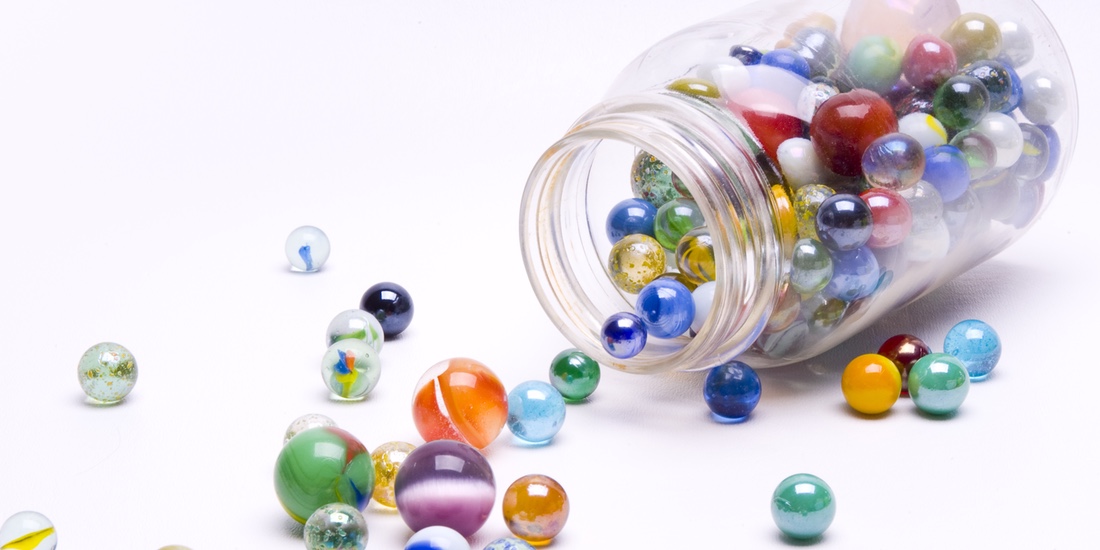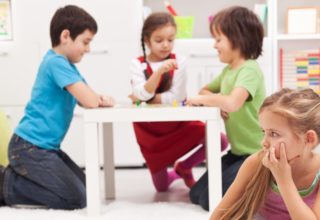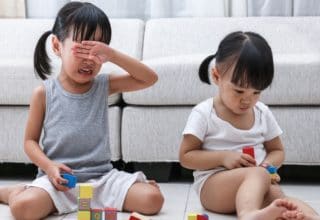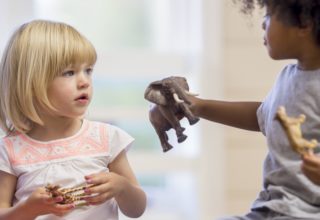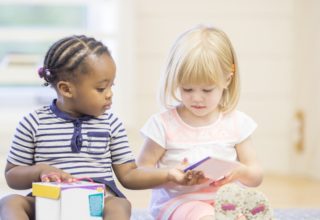Acknowledge and promote positive behavior….*Plinkit* with a Marble Jar!
You’ll be amazed at the twinkle in your child’s eye each time they drop a marble into a jar. Something about that physical *Plinkit* sound sparks a magical connection between cognitive recognition and the positive behavior you want to reinforce (starting as early as age 2.5).
Big picture – Set expectations so your child succeeds, earns lots of marbles, and sees the worth in their actions. And it’s okay if they do something that is motivated by the marble; the object of this tool is to make choices that are kind, helpful and that make everyone feel good. In time, the good choices will become more natural.
Do
Core Marbles
- Identify the theme of your Marble Jar.
- Pick a reasonably sized jar.
- Decide with your child what the reward will be.
- Draw a logo with your child.
- Place the jar in a visibly accessible place.
- Notice and act!
How to Make a Marble Jar
- Identify the theme of your Marble Jar – Pick one behavior you want to focus on. Whatever you choose, make it doable and easily noticed. Some common ideas:
- Kind actions towards others
- Use helping words instead of hurting words
- Include others in play
- Try something new
- Rephrase tone and language – “stop, think, redo”
- Inappropriately “talking back”
- A combination of being “kind, helpful and flexible”
- Be a problem solver
- Follows (listens to) directions the first time
- Pick a reasonably sized glass jar / clear container – You want your child to feel success and satisfaction; don’t make them wait too long for the reward. If the jar is too large, you’ll lose momentum and your child will lose interest.
- Decide with your child what the reward will be – What motivates your child? A camp-out in the backyard? A trip to their favorite place? A popcorn movie party? Or have your child pick one item off a running list of things they’ve asked for. Whatever you choose, make it special and exciting.
- Draw a logo with your child – Decide together what visually represents the behavior you’re targeting and create your own logo for it. Tape it to the jar.
- Place the jar in a visibly accessible place – Let your child see their progress.
- Notice and act! – Once a day (or every 2-3 days for older children), notice when your child is engaging in the positive behavior you’ve agreed upon. Acknowledge your child in the moment, or at a special Marble Jar time. Make a big deal out of their positive actions, and the dropping of the marble into the jar – PLINKIT! Make them proud of themselves.
- “I saw the way you cleaned up your toys without anyone asking. That was very ‘helpful’! You deserve a marble for being so ‘helpful’ today”.
- “I saw that you found something else to play with, even though you really wanted to play with that toy your friend had. You had a choice to be angry, or to have fun and try something new. You chose to have fun. Thank you for being ‘flexible’. That choice is definitely a marble in the jar for you.”
- “You noticed that your sister was having trouble making her blocks stable and you stopped what you were doing to help her. That made her feel good. How did it make you feel? I want to put a marble in the jar for you.”
- “It was hard for you when you saw your friend crying and upset. I know that makes you uncomfortable, but I saw you take care of yourself by taking deep breaths. I want to put a marble in the jar for you because being kind to yourself makes everyone feel good.”
- “You were angry with your brother when he wanted all my attention today. But instead of getting upset you told me with your words how you were feeling and what you needed. That made it easy for us all to be together. Marble in the jar for you!”
- BE CONSISTENT – For example, if the behavior you’re trying to encourage is “to be kind, helpful or flexible”, stick to these three words when referencing the Marble Jar, and use these words consistently in your everyday activities.
Bonus Fun!
- If your Marble Jar is shared among two or more children, try having the kids award each other the marbles (instead of having an adult notice the behavior and award the marble). It’s a fun way of building community and accountability, and having children encourage one another.
What to Do When Your Child Does Things Just to Get Marbles?
- Tricky topic since the whole point of the Marble Jar is to get marbles. Inevitably, some children are going to adjust their behaviors and increase their good deeds just to fill the jar faster. Avoid this common reaction by setting up rules with your child BEFORE you begin. For example:
- Your child will only receive marbles for certain actions – nothing more, nothing less.
- Your child can only receive a marble if they did something because it was the right thing to do, not because they wanted a marble.
- Who gets to decide what action is worthy of a marble? – An adult? Anyone in the family? The child? Or is the rule to only give marbles to others?
- Frame rules about asking for marbles – When your child says “Do I get a marble for …” acknowledge that they’re thinking about doing the right thing and assure them that you’re noticing and that marbles will happen.
- “You’re really thinking about helping others; I see all the good things you are doing. You should be proud of yourself. I am going to put marbles in the jar every time I see you making good choices.”
- “Marbles are a surprise. When I see you make a good choice, I will surprise you with a marble.”
- Set up a rule to put both you and your child at ease – “It gets hard when you ask me for marbles all the time. We are going to put marbles in the jar when you do something because it feels like the right thing to do, not just because you want a marble.”
What to Do If the Marble Jar is Not Resonating with Your Child
- To make the Marble Jar a useful and motivating tool, it must have meaning for the child; they must be invested in the actions and outcomes. If your Marble Jar is not working, it’s time to make adjustments.
- Talk to your child. Investigate their thinking. Ask them what they want from the Marble Jar.
- What kinds of actions deserve a marble?
- What will be a motivating reward when the jar is full? Let your child be the driver.
- If your child is part of the decision-making process, they are more likely to be motivated.
When to Stop Using the Marble Jar
- If you’ve filled the Marble Jar once or twice before, and your child’s behavior is consistent without marble rewards.
- If you or your child are no longer remembering the Marble Jar, it has probably served its purpose.
- If you’ve tried the Marble Jar using several variations and it still doesn’t resonate with your child, then it’s time to try a different motivator.

Jetta Jacobson, Teacher + Early Childhood Professional
Jetta Jacobson holds a M.A. and teaching credential in Early Childhood Special Education from San Francisco State University. She taught in a fully inclusive preschool for 20 years and now shares her knowledge and experiences as an Instructional Coach for San Francisco Unified School District. Jetta also teaches early childhood courses at San Francisco State University.
A classroom favorite for cultivating empathy, kindness, community membership and awareness of others. What’s a real superhero? Someone who helps...
We can’t end sibling fighting nor force our children to get along, but we can help them recall happy moments...
A simple tip sheet for how to praise your child. Something more than “Good job” or just commenting on process and...
“Empathy is when you’re able to understand and care about how someone else is feeling.” -Mark Ruffalo, Sesame Street
Watching a child turn to you crying for the first time because “A friend said ‘I can’t play’”, is a...
Sibling fighting and rivalry is normal and, in most cases, healthy. Learn how to resolve sibling conflict in 5 simple...
Get flustered in the heat of the moment when your children fight? Use these three key phrases to stop sibling...
Siblings fight – it is normal and expected, and you can handle it. But sometimes, stepping outside of the normal...
While some children inherently understand how to socially interact with others and are comfortable with basic social skills, others need more...
We teachers have the good fortune of learning and playing with a wide range of children in class and are...
Simply saying “Share!” holds little meaning for children. Young children are egocentric and concrete thinkers. Their experience of the world...
Conflict is natural for preschoolers who are just learning about peers and group settings – it is expected, healthy and...
It may feel like a number of impulsive behaviors are seemingly normal for children. But what is ‘normal’? In this...
Brain differences make it hard for a child to control their behavior. Understanding your child’s impulsive behaviors can help you...
Empower your child to manage their emotions and regain control in heated situations with *STOP!*
A breathing exercise to help your child move through the rocky moments in their day. Easy to do and remember....
Tattling is very common but it can be shaped by our responses to their tattling. Teach your child this simple rhyme to work...
Around the ages of four and five, children begin to tell ‘tall tales’. They may also begin to tell fibs...
We may have grand intentions when it comes to involving our kids in chores. But how do you know which...
Power struggles and harried mornings for both parent and child are normal, and yet not a fun way to start...
